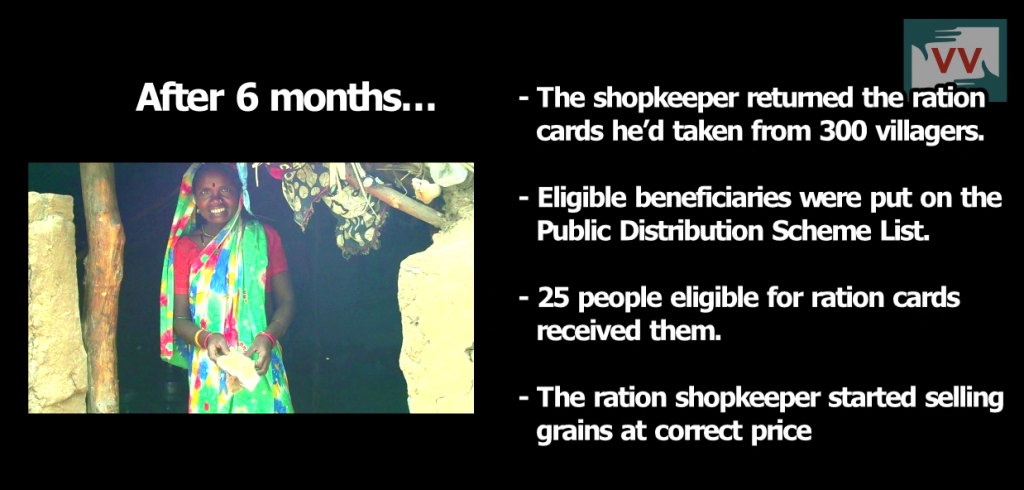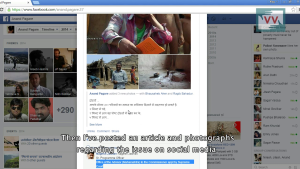India is home to 190 million of the world's hungry. A staggering number by any count. To combat this the government has put into place a number of schemes, most importantly the Public Distribution System. Bogged down by corruption and neglect at every level, the scheme often does not reach those it is meant for.
In February 2014, Community Correspondent Anand Pagare reported from the village of Daregaon in Maharashtra where 300 families were bearing the brunt of corruption in its worst form. He used a combination of video-reporting and on-ground advocacy and mobilised the local media and his social media networks to end the corruption in this village.
The dealer of the local Ration shop was not only selling food grains at a rate higher than the stipulated INR 2 per Kg, but was also trying to swindle those who were waiting to get their ration cards.
Ration Cards are the identity and eligibility proof on the basis of which India’s Public Distribution System (PDS) works. The card is essential to get rations such as wheat, rice, kerosene and sugar at subsidised rates of INR 2-3 per kg. The ration card also serves as an identifier of beneficiaries of Government schemes aimed at those living below the poverty line. Every person is entitled to a ration card, which is classified in three categories: Antyodaya (extreme poverty level), Below Povery Line (BPL Card) and Above Poverty Line (APL). The government replaced it with a microchip-installed Smart Card in some parts of the country.
"My main goal was to empower the community where I was filming this video. This is also Video Volunteers' main goal. I wanted them to know that they had the power to change their situation.
 So I got them together and we filed applications at the Block Office and Supply Officer (In charge of ration distribution in the Block) to get things moving," says Anand who worked for six months to achieve the Impact.
So I got them together and we filed applications at the Block Office and Supply Officer (In charge of ration distribution in the Block) to get things moving," says Anand who worked for six months to achieve the Impact.
When the applications and media pressure failed to wake authorities fromm their deep slumber, Anand tried a new trick-- Social Media.
In our times of 'clicktivism' he felt that flooding his Facebook page with the evidence and appeal from Daregaon would yield some results. And so it was that Mr Nagesh Jhadhav reached out to help.
Mr Jhadav is a Senior Programme Officer at the Office of the Advisor to the Commissioner appointed by the Supreme Court. Anand had the attention of the right people. It was only after Mr. Jhadav and his colleague Dr. Shirvadkar submitted a fact finding report to the Block Office and the Supply Officer did they reach Daregaon to hold the corrupt ration dealer accountable.

Through this Impact:
- The shopkeeper returned the ration cards he'd taken from 300 people.
- Eligible beneficiaries were put on the Public Distribution Scheme list.
- 25 people eligible for ration cards received them.
- The ration shopkeeper started selling grains at the correct price.
"I know that the only reason this change has been possible is because of the support of lots of people like you. From the community themselves to freinds and strangers on Facebook, we formed a little community that brought change to 300 lives," says Anand.
Anand Pagare is currently the State Coordinator of Video Volunteers' Maharashtra state office and also mentors other CC’s in creating change. Anand can be found on social media doing his bit of online activism during his free time. He started his association with VV as a Community Correspondent reporting from Malegaon, one of the most sensitive areas in India. A hot bed of communal strife, the region is in the constant grip of violence and religious tension. These stories are rarely picked up by the mainstream presses, and atrocities happen under the radar.
The happiness that comes with an yearly bonus
This video is a story of success, a story of a small win against a giant corporation. A story of persistence and a never-say-die attitude. This year, the workers of 3 gardens in the Alipurduar area of Kumargram Block, received a slightly increased yearly bonus, an increase of 3%, from...
Yashodhara – A salve for the social injuries of the Dalits in Mumbai’s slums.
Yashodhara Salve’s style of community journalism has led to Dalit women marshalling against atrocities they faced, women standing up against traditions that exile them from society and women going on camera to demand education for their daughters which is a basic right. The 38-year old Community Correspondent grew up in...


